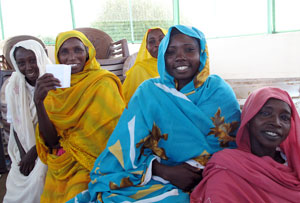
Participants of the tailoring at SCC Community Center. The program helps the camp residents to become self-reliant and provide a means for them to support their families
Credits: Caritas
By Edwyn Shiell, Act for Peace – Campaigns & Communication Coordinator
Since the expulsion of 13 International non- government agencies in March 2009 the ACT-Caritas Darfur Programme, implemented by Norwegian Church Aid (NCA) and its two National Partners the Sudan Council of Churches (SCC) and Sudanaid, have had to deal with the significant gaps in education services in the Internally Displaced People’s (IDP) camps.
Despite the shortage of education facilities in Bilel camp and the insecurity which the workers must face on a daily basis, great strides have been made in delivering adult education. Camp residents are gaining the means to take control of their lives and provide for their families, though the reduced education services are a concern for residents.
Ahmed Yacoub Salahaldin the Chairman of Youth in Bilel camp said, “I teach adult education here in the centre. My family however are all at home without anything to do. I must look after and provide for them.
“Before I came here I was living in Benaco village 2 km from here. Tribal conflict led me and my family to come to Bilel Camp in 2003. I have been here 7 years now. My entire village in Benaco was burned down. My family’s house was destroyed. We made our journey to the camp here. More than 1000 individuals fled on that day. Some of them are in Kalma camp, the rest are living here in Bilel Camp.
“Since living here in Bilel, NCA and SCC have continued to assist us with many services for the people including education, food programmes, water and the provision of medicines… We are very grateful for this vital support, though at times the support has not been enough.
“There is a gap in education services. Here in Bilel, we have only one school and over 100 students attend. We feel this is too much and the gap in education is growing.
“The services the SCC are providing are extremely helpful. The masonry, tailoring and welding programmes help the camp residents to become self-reliant and provide a means for them to support their families. In the future, we hope that these services will continue to increase.
“Currently, in my role as Chairman for the Youth, teenagers in the camps are under serviced. Many wander around still with very little to do. We hope that the partners providing support can address these gaps left by agency expulsions and more constructive services for the youth are provided for the sake of future generations.”
Martin echoes Ahmed Yacoub Salahaldin’s points and elaborates on some of the reasons for the gaps in services. He is also an Educator in the camp who holds classes for adults in the SCC Community centre.
“I have now been in Bilel Camp for 4 years. I came here with my family. Before, SUDO (Sudan Social Development Organisation) was providing adult education and kindergarten teaching. We are now holding adult education and basic education classes in the SCC centre. The Kindergarten is no longer here after SUDO was expelled which has been difficult for the children and their mothers.
“There are two schools currently operating but they cannot provide for the enormous number of children who wish to attend. This is a great concern for us in the camp as community leaders. The number of people interested in attending classes are very high, so we need to construct extra classrooms and increase the amount of the teachers we have in the camp.
“Half of the children in the camps manage to go to school but with new influxes of displaced people coming to Bilel, the two schools can no longer accommodate all the children.
“I am working as an adult teacher and am now a professional and can provide for my family. In the centre there are only two teachers. There are several teachers available; we just need the premises to accommodate all the children.”
Whilst the people in the community talk about the gaps in education that are present in Bilel, there has also been amazing results which David Kat, the Education Officer for the SCC emphasizes.
“There are many children going to school now and many of the women are finding happiness because of their improving socio-economic status. Relationships with the community are vital for this work to flourish and we have all grown very close.”
It is evident from the vibe in the community centre that there is a great deal of trust and mutual respect between the workers and the camp leaders who have received training. There is a strong sense of partnership and collaboration which has made the community centre a success, though support is needed to continue SCC’s education drive and provide for the increasing needs of camp members.
David said, “We need support to the Darfur programmes so we can fill the gaps of certain areas of NGOs that have been chased out of Darfur. We request the ongoing support of the international community and the Sudanese diaspora. Please contribute to the change in the lives of these people. This is vital.”
Caritas Internationalis works in Darfur in cooperation with Action by Churches Together (ACT) helping 350,000 people, including 240,000 who have lost their homes. The implementing partner, Norwegian Church Aid, has two national Sudanese partners, the Sudan Council of Churches (SCC) and Sudanaid (Caritas Sudan).
